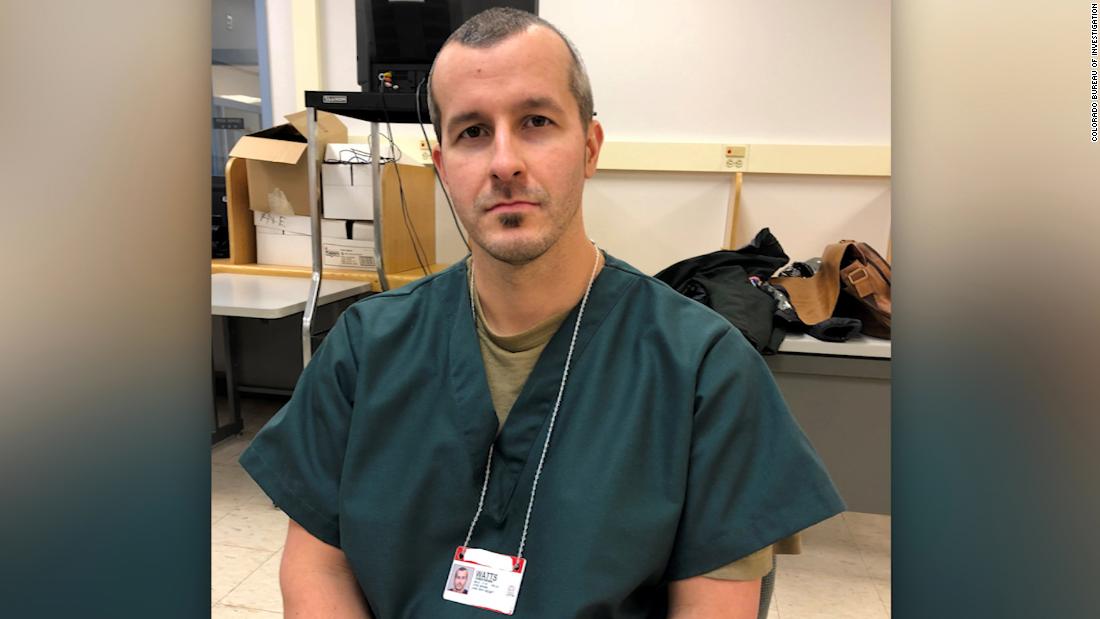[ad_1]
The interview was recorded last month but wasn’t made public until Thursday.
Watts, 33, killed his pregnant wife, Shanann, 34, and their two children, Bella, 4, and Celeste, 3, in August before disposing of their bodies at a secluded oil field where he worked. Colorado prosecutors said he strangled his wife with his bare hands, suffocated the children and loaded them in his vehicle and drove away to hide their remains.
He pleaded guilty to the killings and is serving five life sentences after prosecutors and Shanann’s family agreed to drop the possibility of the death penalty.
Here’s what we’ve learned from the interview:
He didn’t know what to do after the murders
Watts hadn’t planned the killings and had not thought about what he would do next.
He said he was not “some criminal mind type.”
“I had no idea what was going to happen … after everything … I mean I don’t even know how I was acting even normal to people that I was around,” he told investigators last month.
He felt like he was not in control of his actions and was surprised anybody could understand him when he was speaking.
“Nothing was right,” he said. “It was just like a reaction of something that I wasn’t even thinking about.”
He pleaded guilty ‘to end it all’
A few weeks after his arrest, Watts told his attorneys he had killed his family and said he wanted to plead guilty in court.
“I didn’t want my attorneys to lie for me for two or four years,” he said.
He didn’t want people to relive their pain or be obligated to travel back to Colorado several times.
“If we can end this, let’s end it,” he recalled telling his attorneys.
“[I]f there is any closure they can have it right then instead of 2022 because it will only get worse for everybody.”
Why did he first pin the blame on his wife?
He denied for days that he was involved in his daughters’ killings and told police he saw his wife smothering their two daughters, according to court documents.
When asked by officials last month, Watts said he hadn’t considered blaming his wife until he spoke to police.
“Honestly, I never even thought about the story until you guys mentioned it,” he said.
“I just went for it.”
He thought his mother and his sister would probably believe his story, he said, because they “just really never liked Shanann.” And some of their friends could believe that, too, because her personality was more dominant than his.
He removed his wife’s wedding ring
Watts said he took Shanann’s wedding ring off her finger and put it on the counter when he returned home from disposing of the bodies.
“It’s like you know, maybe she really actually wanted a divorce. Maybe she didn’t want to fix it and just put it on the counter,” he said.
He also mentioned that he took a therapy book that his wife wanted him to read and threw it in the trash.
If he had planned things better, he said, he would have taken his wife’s cell phone to the oil site with him. When police searched their home, police found her cell phone between the cushions of a sofa.
A polygraph test broke him
Days after killing his family, Watts was questioned by investigators at the Frederick Police Department for a while and was given a polygraph test, which he failed.
“It was horrible,” he said.
“Like, you would ask me questions for like 3-4 hours beforehand and then you do the polygraph, and then it’s like you break down some of my brain too much. It’s like Jell-o.”
He agreed to talk to officers that day but when he arrived, he had a bad feeling.
“Walking in there that day, just walking into that room, I knew I wasn’t walking out,” he said.
He was hesitant to speak with reporters
Watts appeared on a local Colorado newscast as a concerned father, pleading for the return of his family a week before he was arraigned in court on multiple charges in their deaths.
But he didn’t want to do media interviews. It was a friend of Shanann’s who set them up.
“I felt like you know, they would have just kept knocking on my door until I answer it,” he said.
While a friend suggested he should not speak to reporters, he said, detectives told him that it was his decision.
He felt uncomfortable and “it was like I was just lying to more and more people.”
CORRECTION: This story has been updated to correct who helped set up media interviews with Watts after his family disappeared.
[ad_2]
Source link

